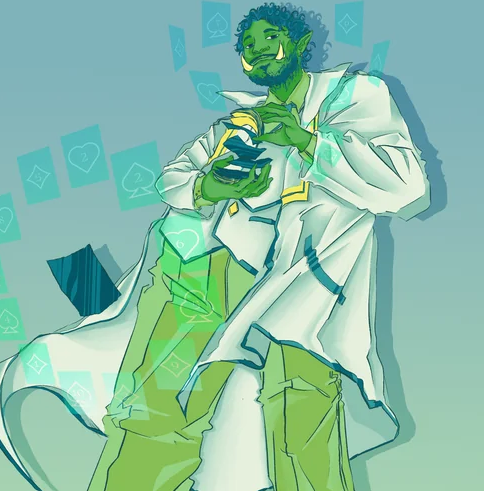At least at low levels. Every combat so far was absolutely carried by our parties fighter just beating the enemies into a pulp :)
Did you mean “bending”?
Bending, bedding. Fucker, lover …
Yeah, just a case of sausage fingers.
Learn to proof read your shit :)
kindly, of course ;)
on their perilous quest to lay dragons, ogres, skellingtons etc
A noble quest we all aspire to take on
Gotta put reality to bed
It somewhat makes sense in universe though, if any guy who spends a few years in a magic school can best your guards/rookie soldiers without a sweat there would only be magic users!
I’ve always taken the opposite logic. If everyone could learn magic, everyone would be a mage, because magic should be powerful. If you can compete with magic with a sharp stick, why would anyone take the decades of study to learn magic?
I think it’s canon that wether in DnD or PF anyone can learn arcane magic if they take the time to do so (and they have a way to pay for it, most people can’t afford to not work for 5-10 years)
The thing is, even if someone has the money and the time maybe they don’t want to spend it, especially if magical scrolls/wands can let you cast spells fairly easily.
To me it’s the same thing as saying to some kid “you can learn to be a robotics engineer and in 5-10 years and $100k of debt you’ll be able to make robots that can do anything for you, including being strong” and the kid just replies “That’s cool, but I think I’ll just go to the gym thank you”
Depends on the setting, in D&D. In Krynn, for example, you must possess an inborn aptitude (actually a blessing from the moons) to learn magic. Someone without it simply cannot learn it.
Magic users in dnd are far from that powerful. Most dm though are not experienced enough to deal with it.
This is incorrect. The magic user kits are generally fine and if the mages just stick to damage spells they are probably mostly in line with other classes for damage (worse single target, better aoe). But there are a lot of spells that are fairly game breaking when you move outside of damaging ones.
They’re not game breaking if you correctly read the rule and prepare a bit against them.
Needing to cover half the world in antimagic fields is a sign that it is, in fact, too strong.
Only an idiot needs anti-magic fields to fight magic.
Eh, I’m experienced as fuck, and once you learn Simulacrum it’s basically over.
Also, forcing the DM to “deal with” you is power; narrative power. An “OP” fighter requires you to add another enemy, or increase some HP, or higher athletics DCs. The types of things they can do barely change. As a wizard levels up, you have to account for their powers in more and more scenarios until your entire prep time amounts to “how can I make this interesting and not just something the wizard negates?”. Every midboss needs to either know counterspell or have an abjurer on staff. Anywhere you don’t want the PCs to go has to be covered in guards and wards and forbiddance. Every fight needs legendary saves and the ability to reshape the battlefield to become meaningful.
The fact that with enough effort you can negate their power isn’t proof they’re not powerful, it’s proof they are.
Simulacrum. Lvl7 spell. Extremely long casting time and very expensive. Once you got this, you’re an archmage.
Your problem in this case is the scope of the story. At this stage, you cannot think merely of an encounter by itself. How you get to the encounter is the whole game. And you cannot be passive either.
You are mistaken on one point: the dm doesn’t deal with a player, a vilain deals with a character. That’s a significant difference.
Which goes back to the archmage bit: if a pc is an archmage, a vilain can’t ignore it. It’s like Sauron can’t ignore Gandalf. The story becomes about the vilain versus the players’ characters. Exactly like in any comics where it more often goes into tier3 than the classic fantasy.
As for the fighters, there is one discrepancy in dnd 5e between martials and spellcasters : spellcasters are given their tools in their class progression while martials need to seek their strategic power into the game.
But this is unfairly putting things actually : a wizard needs a lot of things in the game too. Like the materials for your simulacrum. This means that spellcasters merely have more guidance on what they should seek in the world than martials. Martials players should merely look at the downtime activities to know what they can look for.
Sure, you can add an enemy to counter the martial, but what will you do against the army he recruited?
That is what tier3 is about. That is what 5e rules do to the game. You may not like that. Then pf2e is certainly better for your table as far as I understand.
The problem with 5e is that people don’t understand what tier3 and 4 are about.
If you want to see what tier3 is about, you should have a loot at what kind of humanoid are still in this tier in the monster manual.
Is PF2e worth picking up? Our group has been using 5e (mostly as dndbeyond is convenient) for our past couple campaigns.
Yes, but I would hold off on buying any rulebooks until the remaster comes out. All of the rules are free online, and the Pathbuilder app/website is very helpful in seeing which options are available for you. If you want a good starting point, I recommend an adventure path, which is a 3 or 6 book campaign that takes you from levels 1-20 (six book) or levels 1-10 or 10-20 (three books). They’re much better than the published adventures for some other games, since Paizo’s history is in writing adventures, and they don’t require much work beyond what is in the book for a satisfying story and adventure. Those are fine to buy, since they are compatible with the new version and they will not be reissued later. Same with setting materials, which are extensive and have a good amount of detail on various places in the world. I’d try things out in roll20 or foundry, which have the base rules integrated for free, and see if you like it.
If you want deeper rules for things, PF2e is good. If you want simpler and more story-focused rules, picking up Index Card RPG or Knave might be good.
Simpler game such as ICRPG tend to be a bit harder for the DM tho. But as a dm I love icrpg nonetheless
IMO, yes. When I want a modern D&D-type game (i.e., heroic high fantasy, somewhat crunchy, focused on set piece encounters) I’d reach for PF2e over D&D5e any day. It works as intended, give players more interesting choices, it’s way easier to GM, and despite seeming way crunchier at first blush, the rules are much smoother in play. Plus, all the rules are available for free online, with the express permission of Paizo. It’s ultimately a matter of personal preference, so you may or may not like it, but I’m at least confident saying it’s a well-made system that’s worth checking out.
Like StarPupil said, there’s a new revision coming out soon, so I’d wait until then. It’s still 2e, and will still be compatible with everything, but they’re making some minor tweaks, including some errata, and scrubbing any little bits that might still depend on the OGL. If you like PDFs (which Paizo actually makes and sells, unlike 5e!), you can also keep an eye out for Humble Bundles. There are occasionally some great Pathfinder 2e bundles, which tend to include the core rulebooks and a ton of other stuff, including full adventure paths.
I like it as a direct replacement and if you’re interested in giving it a peek you can check out the entire ruleset with no Pathfinder Beyond subscription needed. now excuse me as i vanish back into the pathfinder free marketing dimension, eheheheh
I personally think so. It is in many ways similar to 5e but a bit denser on rules. It feels like the designers really wanted to make sure that there were no weird corner cases. And while there is a lot of them, the rules all seem very logical and consistent. So when playing it feels a bit more “mechanical” or “game-y” but also less wonky than 5e can be. It is a somwhat different experience than 5e and the rules are available for free at Archive of Nethys. But if you should pick it up really depends on whether your group is unsatisfied with DnD or itching for something new. Our group changed over after trying a one shot and because our DM was getting a bit bored with 5e.
Dare to explore the world of classless role-playing. Fate, Savage Worlds, Cortex. Take a walk on the wild side.
Fighters are so good, they’re basically the Champion subclass of 5e, but their expanded crit range is also an expanded hit range, twice as big, and scales with every accuracy buff and AC debuff you or your team puts on your enemies. Team up with a bard and you’ve got something stupid like a 12-20 crit range on on-level enemies. Team up with a wrestler and you’ve got reaction attacks to ply that range on.
They are also simultaneously the battlemaster fighter, eldritch knight, and whatever else you want to tack on if you’d like, or none of them if you want to keep it simple.
Don’t forget that crits are actually GOOD in PF2e because they multiply all damage instead of just the base weapon die.
Unless you’re talking about the playtest, DnD you double all the damage dice, not just the base weapon dice. Sneak attack, smites, anything that’s not locked away behind a separate saving throw (like poisons) or just a flat damage boost (like +5 to STR) all gets doubled.
PF2e is great though, would love if one of my games switched over some time.
And of course, what weapon you’re holding can further modify weapon crits. Picks do more direct damage, axes do cleave damage, hammers knock foes on their ass, fists can knock the wind out of enemies, giving them less actions, etc.
I’m particularly fond of bows, which can pin enemies to a surface, its really good when combined with a teammate who can knockback enemies with a club or shield crit or just a shove.








